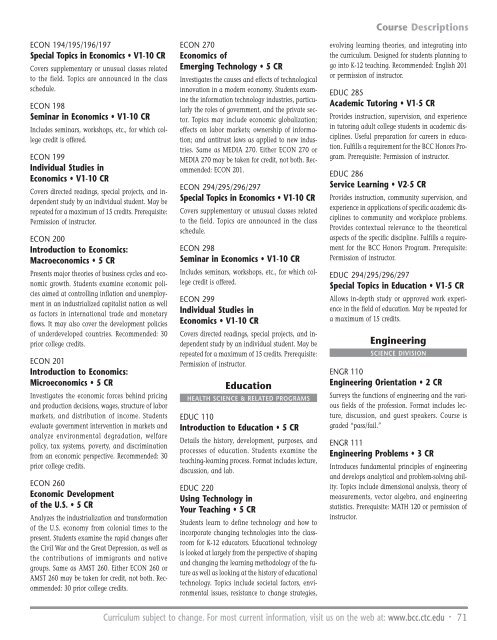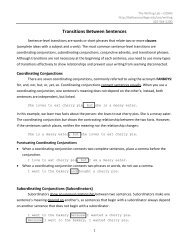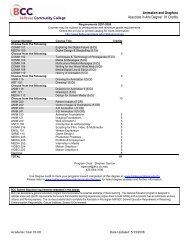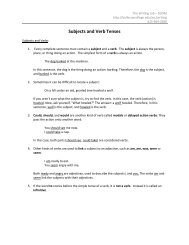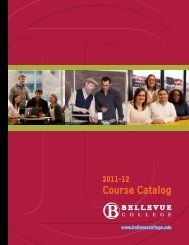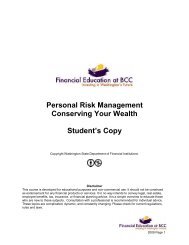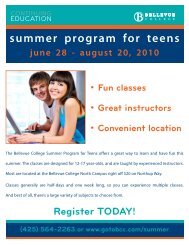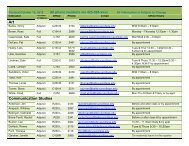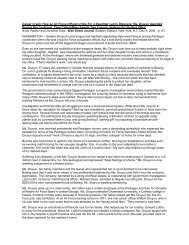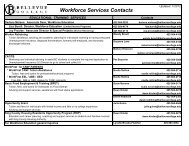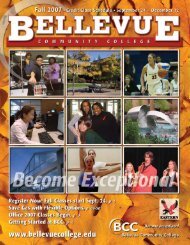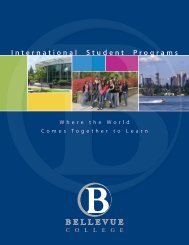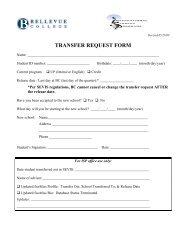2003 / 2004 - Bellevue College
2003 / 2004 - Bellevue College
2003 / 2004 - Bellevue College
You also want an ePaper? Increase the reach of your titles
YUMPU automatically turns print PDFs into web optimized ePapers that Google loves.
ECON 194/195/196/197<br />
Special Topics in Economics • V1-10 CR<br />
Covers supplementary or unusual classes related<br />
to the field. Topics are announced in the class<br />
schedule.<br />
ECON 198<br />
Seminar in Economics • V1-10 CR<br />
Includes seminars, workshops, etc., for which college<br />
credit is offered.<br />
ECON 199<br />
Individual Studies in<br />
Economics • V1-10 CR<br />
Covers directed readings, special projects, and independent<br />
study by an individual student. May be<br />
repeated for a maximum of 15 credits. Prerequisite:<br />
Permission of instructor.<br />
ECON 200<br />
Introduction to Economics:<br />
Macroeconomics • 5 CR<br />
Presents major theories of business cycles and economic<br />
growth. Students examine economic policies<br />
aimed at controlling inflation and unemployment<br />
in an industrialized capitalist nation as well<br />
as factors in international trade and monetary<br />
flows. It may also cover the development policies<br />
of underdeveloped countries. Recommended: 30<br />
prior college credits.<br />
ECON 201<br />
Introduction to Economics:<br />
Microeconomics • 5 CR<br />
Investigates the economic forces behind pricing<br />
and production decisions, wages, structure of labor<br />
markets, and distribution of income. Students<br />
evaluate government intervention in markets and<br />
analyze environmental degradation, welfare<br />
policy, tax systems, poverty, and discrimination<br />
from an economic perspective. Recommended: 30<br />
prior college credits.<br />
ECON 260<br />
Economic Development<br />
of the U.S. • 5 CR<br />
Analyzes the industrialization and transformation<br />
of the U.S. economy from colonial times to the<br />
present. Students examine the rapid changes after<br />
the Civil War and the Great Depression, as well as<br />
the contributions of immigrants and native<br />
groups. Same as AMST 260. Either ECON 260 or<br />
AMST 260 may be taken for credit, not both. Recommended:<br />
30 prior college credits.<br />
ECON 270<br />
Economics of<br />
Emerging Technology • 5 CR<br />
Investigates the causes and effects of technological<br />
innovation in a modern economy. Students examine<br />
the information technology industries, particularly<br />
the roles of government, and the private sector.<br />
Topics may include economic globalization;<br />
effects on labor markets; ownership of information;<br />
and antitrust laws as applied to new industries.<br />
Same as MEDIA 270. Either ECON 270 or<br />
MEDIA 270 may be taken for credit, not both. Recommended:<br />
ECON 201.<br />
ECON 294/295/296/297<br />
Special Topics in Economics • V1-10 CR<br />
Covers supplementary or unusual classes related<br />
to the field. Topics are announced in the class<br />
schedule.<br />
ECON 298<br />
Seminar in Economics • V1-10 CR<br />
Includes seminars, workshops, etc., for which college<br />
credit is offered.<br />
ECON 299<br />
Individual Studies in<br />
Economics • V1-10 CR<br />
Covers directed readings, special projects, and independent<br />
study by an individual student. May be<br />
repeated for a maximum of 15 credits. Prerequisite:<br />
Permission of instructor.<br />
Education<br />
HEALTH SCIENCE & RELATED PROGRAMS<br />
EDUC 110<br />
Introduction to Education • 5 CR<br />
Details the history, development, purposes, and<br />
processes of education. Students examine the<br />
teaching-learning process. Format includes lecture,<br />
discussion, and lab.<br />
EDUC 220<br />
Using Technology in<br />
Your Teaching • 5 CR<br />
Students learn to define technology and how to<br />
incorporate changing technologies into the classroom<br />
for K-12 educators. Educational technology<br />
is looked at largely from the perspective of shaping<br />
and changing the learning methodology of the future<br />
as well as looking at the history of educational<br />
technology. Topics include societal factors, environmental<br />
issues, resistance to change strategies,<br />
Course Descriptions<br />
evolving learning theories, and integrating into<br />
the curriculum. Designed for students planning to<br />
go into K-12 teaching. Recommended: English 201<br />
or permission of instructor.<br />
EDUC 285<br />
Academic Tutoring • V1-5 CR<br />
Provides instruction, supervision, and experience<br />
in tutoring adult college students in academic disciplines.<br />
Useful preparation for careers in education.<br />
Fulfills a requirement for the BCC Honors Program.<br />
Prerequisite: Permission of instructor.<br />
EDUC 286<br />
Service Learning • V2-5 CR<br />
Provides instruction, community supervision, and<br />
experience in applications of specific academic disciplines<br />
to community and workplace problems.<br />
Provides contextual relevance to the theoretical<br />
aspects of the specific discipline. Fulfills a requirement<br />
for the BCC Honors Program. Prerequisite:<br />
Permission of instructor.<br />
EDUC 294/295/296/297<br />
Special Topics in Education • V1-5 CR<br />
Allows in-depth study or approved work experience<br />
in the field of education. May be repeated for<br />
a maximum of 15 credits.<br />
Engineering<br />
SCIENCE DIVISION<br />
ENGR 110<br />
Engineering Orientation • 2 CR<br />
Surveys the functions of engineering and the various<br />
fields of the profession. Format includes lecture,<br />
discussion, and guest speakers. Course is<br />
graded “pass/fail.”<br />
ENGR 111<br />
Engineering Problems • 3 CR<br />
Introduces fundamental principles of engineering<br />
and develops analytical and problem-solving ability.<br />
Topics include dimensional analysis, theory of<br />
measurements, vector algebra, and engineering<br />
statistics. Prerequisite: MATH 120 or permission of<br />
instructor.<br />
Curriculum subject to change. For most current information, visit us on the web at: www.bcc.ctc.edu • 71


